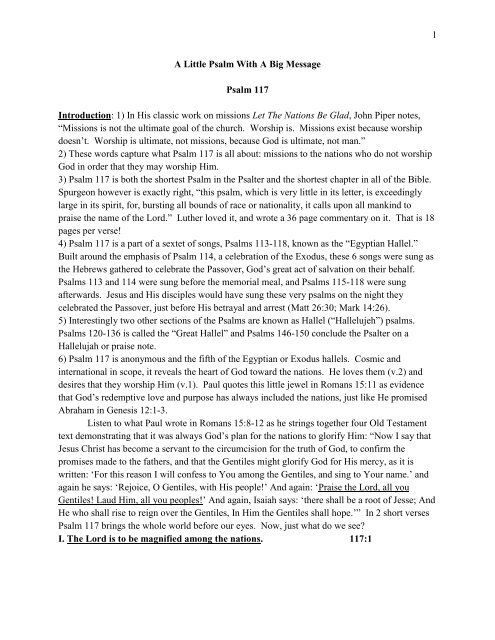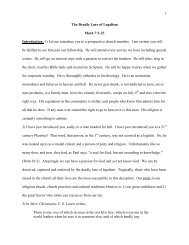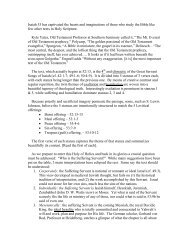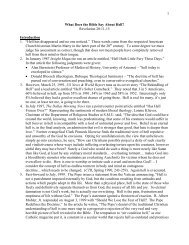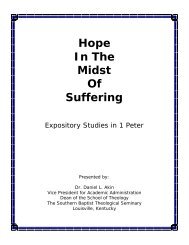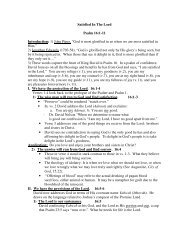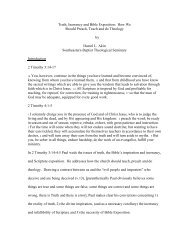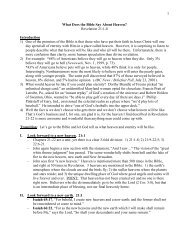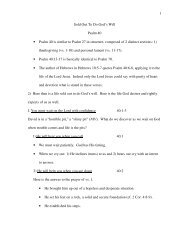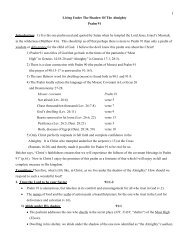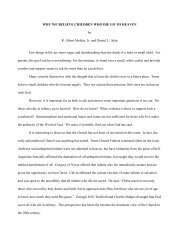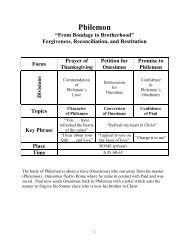1 A Little Psalm With A Big Message Psalm 117 ... - Daniel Akin
1 A Little Psalm With A Big Message Psalm 117 ... - Daniel Akin
1 A Little Psalm With A Big Message Psalm 117 ... - Daniel Akin
Create successful ePaper yourself
Turn your PDF publications into a flip-book with our unique Google optimized e-Paper software.
1A <strong>Little</strong> <strong>Psalm</strong> <strong>With</strong> A <strong>Big</strong> <strong>Message</strong><strong>Psalm</strong> <strong>117</strong>Introduction: 1) In His classic work on missions Let The Nations Be Glad, John Piper notes,“Missions is not the ultimate goal of the church. Worship is. Missions exist because worshipdoesn‟t. Worship is ultimate, not missions, because God is ultimate, not man.”2) These words capture what <strong>Psalm</strong> <strong>117</strong> is all about: missions to the nations who do not worshipGod in order that they may worship Him.3) <strong>Psalm</strong> <strong>117</strong> is both the shortest <strong>Psalm</strong> in the Psalter and the shortest chapter in all of the Bible.Spurgeon however is exactly right, “this psalm, which is very little in its letter, is exceedinglylarge in its spirit, for, bursting all bounds of race or nationality, it calls upon all mankind topraise the name of the Lord.” Luther loved it, and wrote a 36 page commentary on it. That is 18pages per verse!4) <strong>Psalm</strong> <strong>117</strong> is a part of a sextet of songs, <strong>Psalm</strong>s 113-118, known as the “Egyptian Hallel.”Built around the emphasis of <strong>Psalm</strong> 114, a celebration of the Exodus, these 6 songs were sung asthe Hebrews gathered to celebrate the Passover, God‟s great act of salvation on their behalf.<strong>Psalm</strong>s 113 and 114 were sung before the memorial meal, and <strong>Psalm</strong>s 115-118 were sungafterwards. Jesus and His disciples would have sung these very psalms on the night theycelebrated the Passover, just before His betrayal and arrest (Matt 26:30; Mark 14:26).5) Interestingly two other sections of the <strong>Psalm</strong>s are known as Hallel (“Hallelujeh”) psalms.<strong>Psalm</strong>s 120-136 is called the “Great Hallel” and <strong>Psalm</strong>s 146-150 conclude the Psalter on aHallelujah or praise note.6) <strong>Psalm</strong> <strong>117</strong> is anonymous and the fifth of the Egyptian or Exodus hallels. Cosmic andinternational in scope, it reveals the heart of God toward the nations. He loves them (v.2) anddesires that they worship Him (v.1). Paul quotes this little jewel in Romans 15:11 as evidencethat God‟s redemptive love and purpose has always included the nations, just like He promisedAbraham in Genesis 12:1-3.Listen to what Paul wrote in Romans 15:8-12 as he strings together four Old Testamenttext demonstrating that it was always God‟s plan for the nations to glorify Him: “Now I say thatJesus Christ has become a servant to the circumcision for the truth of God, to confirm thepromises made to the fathers, and that the Gentiles might glorify God for His mercy, as it iswritten: „For this reason I will confess to You among the Gentiles, and sing to Your name.‟ andagain he says: „Rejoice, O Gentiles, with His people!‟ And again: „Praise the Lord, all youGentiles! Laud Him, all you peoples!‟ And again, Isaiah says: „there shall be a root of Jesse; AndHe who shall rise to reign over the Gentiles, In Him the Gentiles shall hope.‟” In 2 short verses<strong>Psalm</strong> <strong>117</strong> brings the whole world before our eyes. Now, just what do we see?I. The Lord is to be magnified among the nations. <strong>117</strong>:1
3glory. And they need to hear the message in a way that they will understand.Religious jargon out! Common language in.Missions is a cross-cultural strategy and lifestyle that aims to help people stopmaking much of themselves and to start making much of Jesus. It aims to showthem that none other is worthy of such worship and devotion. It aims to show themthat our maximum joy and pleasure is found only in the praise and adoring of thisGod.I love what John Piper says on this, “The reason God seeks our praise is not becauseHe won‟t be complete until He gets it. He is seeking our praise because we won‟tbe happy until we give it….Missions is calling the world to do what they werecreated to do, namely, to enjoy making much of Christ forever.”Translation: The Lord is to be magnified among the nations.II. The Lord is to be magnified because of His nature. <strong>117</strong>:2There is a rhyme and reason to God‟s call to magnify Him among the nations. It is notarbitrary, whimsical or misplaced. It is not the “because I said so” of a celestial bully orcapricious deity on a cosmic ego trip. No, it is a call rooted in the very nature andcharacter of God that when rightly understood, causes us to rise up and worship Himbecause we must, because we want to.And what can we say about this God? He is great in His love for us and He will befaithful to love us forever. Wow! What a God. No wonder we show praise to Him.Verse 2 is based and grounded in one of the greatest Old Testament verses in the Bible,Exodus 34:6. There the Bible says, “And the Lord passed before him and proclaimed,„The Lord, the Lord God, merciful and gracious, longsuffering, and abounding ingoodness and truth.‟”1) Our God is a God of love.Once more the beautiful and rich Hebrew word hesed appears in our text. Thevarious ways English translations attempt to capture its meaning is instructive:NKJV: merciful kindnessNIV: loveNASV: lovingkindnessESV: steadfast loveHCSB: faithful loveNLT: unfailing loveAnd note, the text says His lovingkindness is “great.” This is a strong andvigorous word used of the stronger side in a battle or overflowing flood waters.Ideas like “mighty” or “prevailing” capture something of the significance of theword. Interestingly it is fronted in the Hebrew text for emphasis, so that literallythe verse reads, “Is mighty over us His lovingkindness.” God floods His childrenwith His love. Illustration: Tim <strong>Akin</strong> being hit by a car when he was 3.Now, how do we apply this to the mission of God to reach the nations? Missionsis telling the nations to praise and extol Christ and then giving them the evidencefor why they should do so. We don‟t just say “glorify the one true and livingChrist” but we give them good biblical and theological reasons why they should.
One is He is a God of love. He loves you. He loves me. He loves the world(John 3:16). First John 4:8 and 16 tells us it is the essence of His nature andcharacter. Our God is a God of love. But, there is a second.2) Our God is a God of faithfulness.If our Lord‟s steadfast love is great, His faithfulness is eternal, everlasting, itendures forever. God made a promise to Abraham in Genesis 12 that all the earth,all the peoples, would be blessed by his descendents. From Abraham came Israel.From Israel came Jesus. God kept His word.“Truth” in the NKJV is once again better translated as “faithfulness” (ESV, NIV,HCSB). The root meaning of the word is “to be firm or unshakable.” It is also thebasis for our English word “amen.” Of course the two ideas are inter-related. IfHe is always truth it is because He is always faithful, and if He is always faithful,it is because He is always truth.What God has promised to do for us in Christ is as certain and sure today as onthe day He made them. And, it will always be this way, now and forever. God‟scharacter cannot change and His promises cannot be broken.Call on Him and you will be saved. But, to call on Him, you must know aboutHim. This is God‟s heart. This is our mission. Praise! Hallelujah! (The Lord isimplied).ConclusionDerek Kidner was right when he said, “this tiny psalm is great in faith, and its reach isenormous” (411). He is also correct when he notes it finds its prophetic fulfillment inRevelation 7:9-10 where we read, “After these things I looked, and behold, a greatmultitude which no one could number, of all nations, tribes, peoples, and tongues, standingbefore the throne and before the Lamb, clothed with white robes, with palm branches intheir hands, and crying out with a loud voice, saying, „Salvation belongs to our God whosits on the throne, and to the Lamb!‟”John Piper is theologically on target, “Missions exist because worship doesn‟t.” So, let‟sget busy for Jesus and see <strong>Psalm</strong> <strong>117</strong> fulfilled so that all the nations might sing“Hallelujah” to our God and to the Lamb.4


